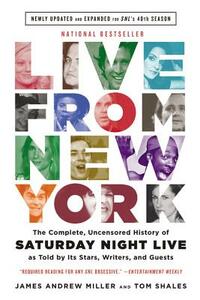Take a photo of a barcode or cover
funny
informative
medium-paced
Second book I've read this year where Jim Downey comes across as a real dick. Which is too bad because he’s obviously a beloved and respected comedy genius.
This dragged towards the end for me, I didn’t realize how little I cared for SNL after ~1995. The real interesting folks with the best stories and perspectives were all in those first 20 years, it seems.
I didn’t know until I was halfway through that they came out with an updated 800-page edition in 2014. So I'll read the last 200 pages of that at some point and mess up my Goodreads stats.
This dragged towards the end for me, I didn’t realize how little I cared for SNL after ~1995. The real interesting folks with the best stories and perspectives were all in those first 20 years, it seems.
I didn’t know until I was halfway through that they came out with an updated 800-page edition in 2014. So I'll read the last 200 pages of that at some point and mess up my Goodreads stats.
emotional
funny
informative
lighthearted
reflective
Nothing like an oral history!
I guess I take Saturday Night Live for granted! The show has been on TV as long as I can remember so it has always been part of my life, even if in the background. Through this book I re-lived some of my favorite cast members and their characters which was great, because I guess I forgot about a lot of them. The changing cast reflects different changes throughout my life too. I thoroughly enjoyed finding out how the show was put together and decisions of cast members throughout the years.
informative
lighthearted
slow-paced
Moderate: Addiction, Alcoholism, Bullying, Death, Drug abuse, Drug use, Eating disorder, Emotional abuse, Fatphobia, Gun violence, Mental illness, Racial slurs, Racism, Rape, Sexism, Sexual content, Suicidal thoughts, Suicide, Toxic relationship, Violence, Xenophobia, Police brutality, Islamophobia, Grief, Toxic friendship, Alcohol, Sexual harassment, War, Injury/Injury detail, Pandemic/Epidemic
Loved hearing all the history and behind the scenes stories.
absorbing!
EXCERPT: Mel Gibson did the show, and he has a pretty strong sense of humor. But I'm not sure if it's really the same sense of humor of the show. I remember him trying to pitch us doing a parody of Brideshead Revisited that he called "Bird's Head Regurgitated." He's like pitching that really strongly, and we were kind of politely nodding and thinking how do we not do "Bird's Head Regurgitated." -- Greg Daniels
EXCERPT: Mel Gibson did the show, and he has a pretty strong sense of humor. But I'm not sure if it's really the same sense of humor of the show. I remember him trying to pitch us doing a parody of Brideshead Revisited that he called "Bird's Head Regurgitated." He's like pitching that really strongly, and we were kind of politely nodding and thinking how do we not do "Bird's Head Regurgitated." -- Greg Daniels
Great book to read when one is, as I am, in the midst of an American comedy appreciation resurgance, thanks to the likes and genius of Amy Schumer, Kristen Wiig, Melissa McCarthy, Maya Rudolph, Amy Poehler, and even the male comedian, Bill Hader (proving that, despite what some intellectuals would have you believe, men can be funny too!).
The main criticisms against this book - that its uber-devotional authors gloss over the grimy, unpleasant, or even "meh" aspects of SNL (the fact that it was so white male-centric for so long, the fact that its mythos often exceeds its actual skit quality) - is true, though not enough to capsize the book. It's actually an amazing piece of research; and the way they structured their mountains of oral material into an informative, insightful narrative was hugely impressive (to me, at least!). It's also, well, true, that SNL has seeped into the fibers of post-1970s American culture in a way that not much else has: not just in its catchphrases ("Trick question: Mike Ditka is God.", "More cowbell!"), but also in its iconic former castmembers (from Bill Murray to Tina Fey), and certain seminal spin-off films like Ghostbusters, Wayne's World etc. It's actually surprising - even horrifying - to me how much of my own comic sensibilities are derivative of that first generation of SNL writers and performers. In fact, it's interesting to compare their influence - at least on Americans of my age - versus the influence of Monty Python. I'd argue that SNL humor was mainstreamed sooner (via the show, its stars, the 1980s films), while Monty Python is still kinda cultish (even though, God, does it feel fusty sometimes - but I guess you can still find people who don't get "Ni!" or "He's not the Messiah, he's a very naughty boy!").
I'm also generally a sucker for biographies and oral histories, and so this was compulsively readable. If you're also a bit of a pop culture obsessive, then it's doubly pleasurable to read about the likes of Don Novello (one of the most wonderful, and unfortunately underrated/forgotten comedians from the doomed 1980-1981 season!) or Chris Farley (oh, Chris Farley!).
I guess some things I missed/would have liked to hear more about were:
- How the comedy landscape evolved, especially with the ascendance of the Daily Show/Colbert Report in the 2000s; talk about competition!
- The SNL catchphrase as pre-Internet meme.
- The way post-SNL careers can take flight (e.g. Will Ferrell, Eddie Murphy) or crash and burn (e.g. Chris Kattan). And why!
- How the structure of the cast seems hard-coded into the show, with many archetypes reincarnating with every turnover: the lovable slacker (Bill Murray, Adam Sandler, Jimmy Fallon, Andy Samberg...), the impressionist/utility player (Phil Hartman, Daryl Hammond, Bill Hader), the black guy (Eddie Murphy, Garrett Morris, Tracy Morgan, Tim Meadows, Kenan Thompson), the "slob" (John Belushi, Chris Farley, Horatio Sanz, Bobby Moynihan). It's actually a bit tiring - especially since it seems landing in the slacker archetype gets you much better odds of post-SNL career survival, and landing in some of the other archetypes relegates you to being underused and underappreciated (I think specifically of Tim Meadows, Horatio Sanz and Bobby Moynihan, who were/are absolutely brilliant and never really got/get enough spotlight skits).
- And the successful meta spinoff, 30 Rock!
Oh man. As you can see, I have a lot to say about this comedy show. As do the authors: This book clocks in at a hefty 600+ pages! But they are very happy, often funny, really fascinating 600+ pages.
The main criticisms against this book - that its uber-devotional authors gloss over the grimy, unpleasant, or even "meh" aspects of SNL (the fact that it was so white male-centric for so long, the fact that its mythos often exceeds its actual skit quality) - is true, though not enough to capsize the book. It's actually an amazing piece of research; and the way they structured their mountains of oral material into an informative, insightful narrative was hugely impressive (to me, at least!). It's also, well, true, that SNL has seeped into the fibers of post-1970s American culture in a way that not much else has: not just in its catchphrases ("Trick question: Mike Ditka is God.", "More cowbell!"), but also in its iconic former castmembers (from Bill Murray to Tina Fey), and certain seminal spin-off films like Ghostbusters, Wayne's World etc. It's actually surprising - even horrifying - to me how much of my own comic sensibilities are derivative of that first generation of SNL writers and performers. In fact, it's interesting to compare their influence - at least on Americans of my age - versus the influence of Monty Python. I'd argue that SNL humor was mainstreamed sooner (via the show, its stars, the 1980s films), while Monty Python is still kinda cultish (even though, God, does it feel fusty sometimes - but I guess you can still find people who don't get "Ni!" or "He's not the Messiah, he's a very naughty boy!").
I'm also generally a sucker for biographies and oral histories, and so this was compulsively readable. If you're also a bit of a pop culture obsessive, then it's doubly pleasurable to read about the likes of Don Novello (one of the most wonderful, and unfortunately underrated/forgotten comedians from the doomed 1980-1981 season!) or Chris Farley (oh, Chris Farley!).
I guess some things I missed/would have liked to hear more about were:
- How the comedy landscape evolved, especially with the ascendance of the Daily Show/Colbert Report in the 2000s; talk about competition!
- The SNL catchphrase as pre-Internet meme.
- The way post-SNL careers can take flight (e.g. Will Ferrell, Eddie Murphy) or crash and burn (e.g. Chris Kattan). And why!
- How the structure of the cast seems hard-coded into the show, with many archetypes reincarnating with every turnover: the lovable slacker (Bill Murray, Adam Sandler, Jimmy Fallon, Andy Samberg...), the impressionist/utility player (Phil Hartman, Daryl Hammond, Bill Hader), the black guy (Eddie Murphy, Garrett Morris, Tracy Morgan, Tim Meadows, Kenan Thompson), the "slob" (John Belushi, Chris Farley, Horatio Sanz, Bobby Moynihan). It's actually a bit tiring - especially since it seems landing in the slacker archetype gets you much better odds of post-SNL career survival, and landing in some of the other archetypes relegates you to being underused and underappreciated (I think specifically of Tim Meadows, Horatio Sanz and Bobby Moynihan, who were/are absolutely brilliant and never really got/get enough spotlight skits).
- And the successful meta spinoff, 30 Rock!
Oh man. As you can see, I have a lot to say about this comedy show. As do the authors: This book clocks in at a hefty 600+ pages! But they are very happy, often funny, really fascinating 600+ pages.
funny
informative
lighthearted
reflective
medium-paced
dark
emotional
funny
informative
reflective
slow-paced
Cool concept. Wish anyone else wrote it.


